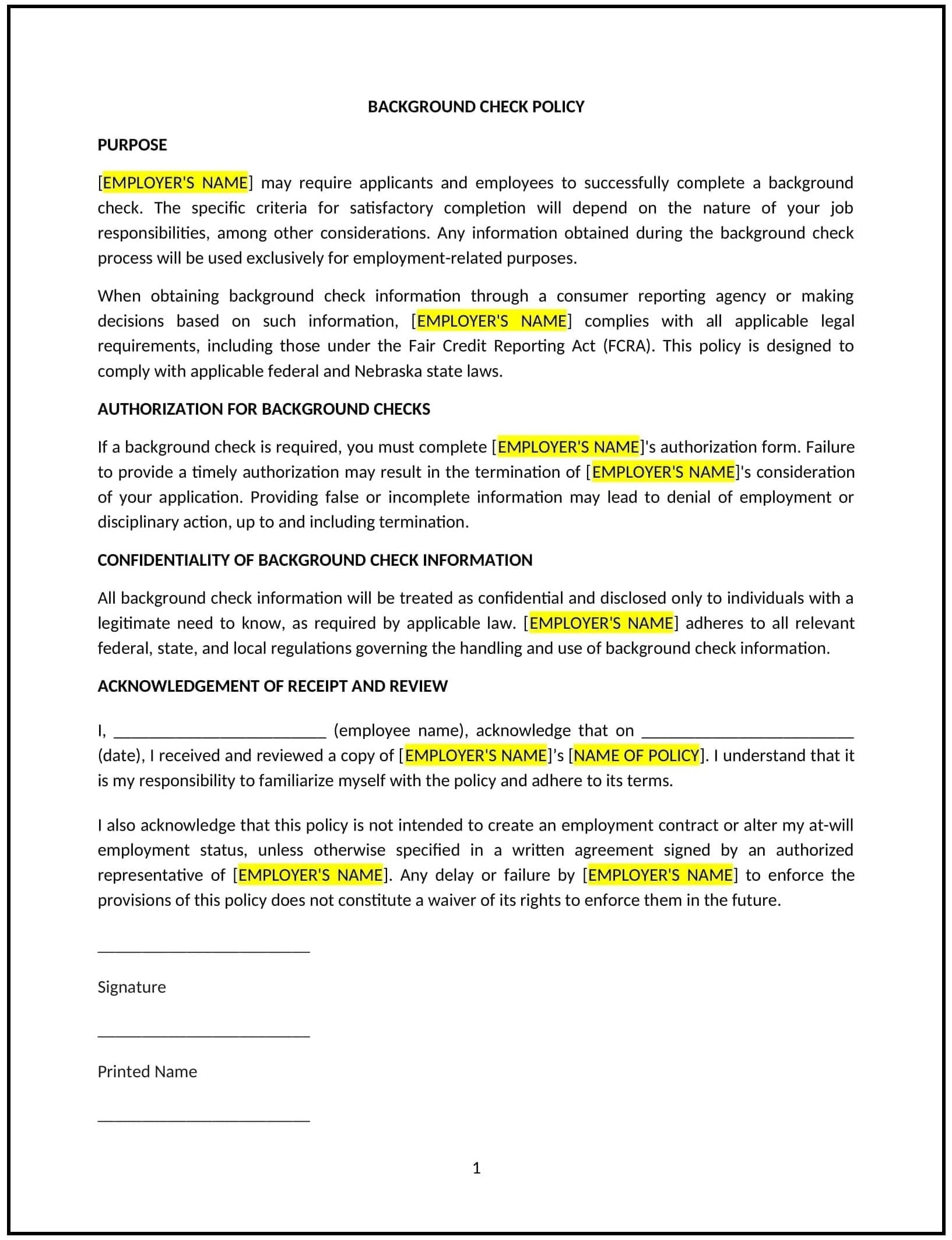Got contracts to review? While you're here for policies, let Cobrief make contract review effortless—start your free review now.

Customize this template for free
Background check policy (Nebraska)
A background check policy helps Nebraska businesses establish guidelines for conducting background checks on potential employees, contractors, and other individuals with access to sensitive company information or resources. This policy outlines the types of background checks that may be performed, such as criminal history, employment verification, and education verification, as well as how the information gathered will be used in the hiring or contracting decision. It is designed to protect the business, its employees, and its customers by ensuring that individuals with a history of harmful behavior or misconduct are not hired or allowed access to sensitive company operations.
By adopting this policy, businesses in Nebraska can make informed hiring decisions, mitigate risks, and maintain a safe and trustworthy workforce.
How to use this background check policy (Nebraska)
- Define the types of background checks: Clearly specify the types of background checks that will be conducted, such as criminal background checks, credit checks, employment verification, and education verification.
- Outline the consent process: Explain that background checks will only be conducted with the consent of the individual being investigated. Provide a process for obtaining written consent and notifying the individual of the check.
- Set criteria for decision-making: Specify how the results of background checks will be used to make employment or contracting decisions. Establish clear guidelines on how certain criminal convictions or other factors may affect the hiring decision.
- Maintain confidentiality: Ensure that any information obtained during the background check process is kept confidential and is only shared with those involved in the hiring decision.
- Comply with legal requirements: Ensure the policy is in line with Nebraska and federal laws, including the Fair Credit Reporting Act (FCRA) and state-specific rules related to background checks.
- Address adverse actions: Outline the process for handling situations where background check results may result in an adverse decision, including notifying the individual and providing an opportunity for them to dispute the findings.
- Review and update: Periodically review and update the policy to reflect changes in state or federal laws, industry standards, or business practices.
Benefits of using this background check policy (Nebraska)
This policy provides several benefits for Nebraska businesses:
- Protects the workplace: Conducting background checks helps businesses prevent hiring individuals with criminal histories or other concerning behaviors that could pose a risk to the safety and security of employees and customers.
- Mitigates legal and financial risk: By verifying the backgrounds of potential hires, businesses can reduce the risk of hiring individuals who might engage in illegal activities or who have a history of misconduct that could result in liability or reputational damage.
- Improves hiring decisions: Background checks provide valuable information that helps businesses make more informed decisions, ensuring they hire individuals who are qualified and trustworthy.
- Promotes fairness and transparency: A clearly defined background check policy ensures that all candidates are treated fairly and consistently, and it demonstrates the company’s commitment to responsible hiring practices.
- Enhances compliance: By following best practices and legal requirements, businesses can avoid violations related to hiring practices and background checks.
Tips for using this background check policy (Nebraska)
- Communicate the policy clearly: Ensure that all candidates understand the background check process, what types of checks will be conducted, and how the information will be used in the hiring decision.
- Obtain consent: Always obtain written consent from candidates before conducting any background checks, and ensure that they are aware of their rights under state and federal laws.
- Use results responsibly: Make decisions based on the results of background checks that are fair, relevant to the job, and consistent with company policies. Avoid using irrelevant factors as a basis for making hiring decisions.
- Provide candidates with the opportunity to dispute findings: If the results of a background check affect the hiring decision, ensure that candidates are informed of the findings and given the chance to dispute any inaccuracies before a final decision is made.
- Regularly review the policy: Ensure the policy is updated to reflect any changes in Nebraska laws, regulations, or industry standards related to background checks and hiring practices.